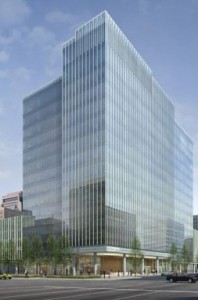 There’s a bit more to the Gateway Plaza than I blogged about yesterday. I caught up with Larry Chapman, a partner in Clayco, the company developing the $110 million office tower in downtown Richmond, and asked him why the City of Richmond needed to chip in $11.25 million to make the project happen.
There’s a bit more to the Gateway Plaza than I blogged about yesterday. I caught up with Larry Chapman, a partner in Clayco, the company developing the $110 million office tower in downtown Richmond, and asked him why the City of Richmond needed to chip in $11.25 million to make the project happen.
It’s all about competition, says Chapman — in this case, competition with Richmond’s suburbs. The lead tenant, the McGuire Woods law firm, is willing to pay a premium rent to locate downtown… but there is a limit. A key sticking point is the cost of parking. In the ‘burbs, employers don’t have to charge their employees for parking. In downtown Richmond, there is an expectation that $120 month is a reasonable price to pay for parking. But, given the cost of building structured parking downtown, the actual charge would be closer to $350 per month. McGuire Woods has to ask itself, would its employees be willing to pay that much of a premium to be able to work in Richmond?
Clayco went to the City of Richmond and said, “We need some assistance,” Chapman says. “If we bring more taxes to the table, will you help finance and own the garage? When they weighed it all out, they said, ‘Yes’.”
Clayco will finance as much of the parking deck attached to the Gateway Plaza office tower as can be supported by market rates for parking, Chapman explains. The city will finance the rest. Clayco and the city will share ownership of the facility. The city will recoup its investment from the roughly $1.3 million revenue stream thrown off by the project’s property taxes. An intangible benefit, as I argued in the last post, is that the project will improve walkability at the heart of the city’s central business district, supporting property values in the area.
From the city’s perspective, Chapman concedes, forking out $11 million may not be the ideal arrangement. But that’s the reality of the marketplace today. “This is the kind of thing you see all over the country. If the economy was fine, you wouldn’t do this.” But the economy is how it is, so you do. As it is, the city still comes out ahead, with tax revenue exceeding debt payments. “If the project didn’t get built, they wouldn’t get any new taxes at all.”
— JAB


